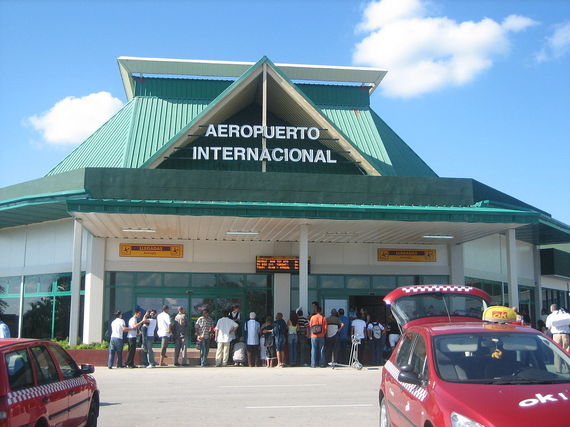[Photo: International Airport "Frank Pais" in Holguin, Cuba. Escla. 21 December 2007.]
Or in Spanish: "El año que viene estamos en Cuba." For the past 55 years, that has been the traditional toast wherever Cuban-American exiles have gathered to celebrate Christmas and New Year's Eve. With all the resolve -- and delusion -- of Brooklyn Dodgers fans in the pre-Castro days, they have raised their glasses and intoned the words. Yes, next year will be our year. This time next year, we'll all be back in Cuba.
Over the ensuing decades, as it became increasingly clear that exile was for Cubans not a temporary migration but the new normal, the annual toast took on a symbolic, wistful air, a dream expressed as a wish in the words of a prayer. And of course, with every passing year fewer people delivered the "next year" toast at fewer gatherings. Many -- my exile parents included -- moved on; although they never embraced Americanness themselves, they at least recognized exile as a waystation on the path to raising a new generation of Cuban-Americans (or, as we were optimistically called at the time, ABCs: American-Born Cubans). The other reason, though, was a more practical one: The older exiles just started dying off.
Fifty-five years later, it is almost cruel to point out the deep irony in the fact that the "next year" toast's fondly expressed wish is literally coming true, just as the hopes and aspirations of the generation that first invoked it are becoming, well, toast.
For anyone who has not been keeping up, Cuba-related highlights of the past twelve months include:
- The United States and Cuba exchanged high-profile prisoners, including the last of the so-called Cuban Five, double agent Rolando Sarraff Trujillo, and in a supposedly unrelated move, U.S. citizen Alan Gross;
Now to this long list of developments -- easily the most momentous year in Cuba-U.S. relations since at least the 1980s, and perhaps even since the Cuban Missile Crisis--we can add the latest: The U.S. and Cuba have agreed to restore commercial air service.
The change will of course not be immediate; it will take at least 60 days, for instance, for airlines to submit proposed routes and have them approved. But the change marks the beginning of the end of the U.S.'s ban on general tourism, which even now contains enough loopholes that just about anyone who wants to go can figure out how to get an exception. Ambiguously-worded categories such as "educational activities" and "humanitarian projects" leave plenty of wiggle room. And certainly any Cuban-American who wishes to travel to Cuba legally will be able to go, under the authorized exception of "family visits."
Which brings us back to the words that begin this essay. This holiday season, for the surviving original Cuban exiles, and their children and grandchildren, "next year in Cuba" is for the first time in 55 years a real possibility. This has not come about as many of us might have wished -- we are still waiting for Cuba to address the matter of their abysmal human rights record, and Cuba is still waiting for the U.S. government to lift the longstanding embargo. Even with all that has happened in the last twelve months, we should not hold our collective breath that either of those facts will change anytime soon.
